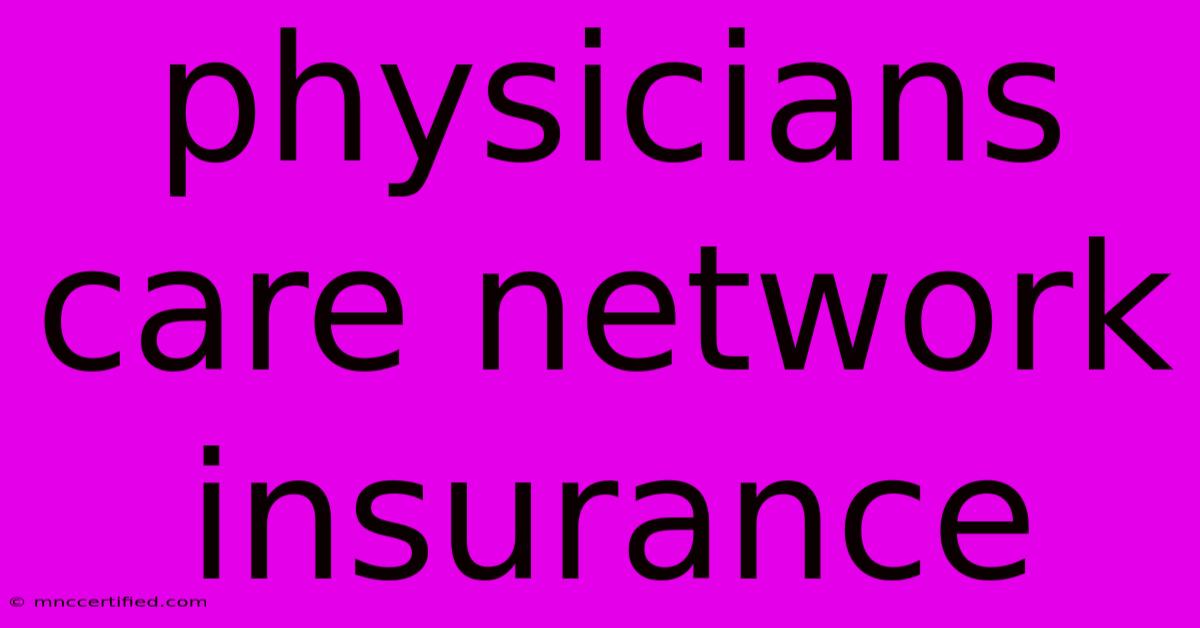Physicians Care Network Insurance

Table of Contents
Navigating Physicians Care Network Insurance: A Comprehensive Guide
Choosing the right health insurance plan is crucial, and understanding the intricacies of Physicians Care Network (PCN) insurance is key for many. This comprehensive guide will delve into various aspects of PCN insurance, helping you make informed decisions about your healthcare coverage.
What is Physicians Care Network (PCN)?
Physicians Care Network isn't an insurance company itself; it's a large network of doctors, hospitals, and other healthcare providers. Many insurance companies partner with PCN to offer plans that provide access to their extensive network. This means your insurance policy might include PCN as part of its provider network, granting you access to the physicians and facilities within it. It's important to confirm whether your specific insurance plan utilizes the PCN network before making assumptions.
Understanding PCN Insurance Plans: Key Features
PCN plans, offered through various insurance providers, typically offer a range of benefits, but these vary significantly depending on the specific plan you choose. Key features to consider include:
Network Access:
- In-Network vs. Out-of-Network: Using in-network providers (those within the PCN network) usually results in lower costs and better coverage. Going out-of-network often means higher out-of-pocket expenses and a more complex claims process. Always verify a provider's participation in the PCN network before your appointment.
Coverage Levels:
- Premiums: The monthly cost you pay for your insurance coverage.
- Deductibles: The amount you pay out-of-pocket before your insurance starts covering expenses.
- Co-pays: A fixed amount you pay for each doctor's visit or service.
- Coinsurance: The percentage of costs you share with your insurance company after meeting your deductible.
- Out-of-Pocket Maximum: The most you'll pay out-of-pocket in a year, after which your insurance covers 100% of eligible expenses.
Plan Types:
PCN plans, like many other health insurance plans, are often offered in different types, such as:
- HMO (Health Maintenance Organization): Typically require you to choose a primary care physician (PCP) who coordinates your care. Seeing specialists often requires a referral from your PCP. Generally, the most affordable option but offers less flexibility.
- PPO (Preferred Provider Organization): Offer more flexibility, allowing you to see specialists without a referral. However, costs are usually higher than HMOs.
- POS (Point of Service): Combines elements of HMOs and PPOs, offering some flexibility while still encouraging use of in-network providers.
Finding a PCN Insurance Plan that Fits Your Needs
Finding the right PCN plan involves careful research and comparison. Consider the following:
- Your Budget: Evaluate premiums, deductibles, and out-of-pocket maximums to determine what you can comfortably afford.
- Your Healthcare Needs: Consider your current and anticipated health needs. A plan with comprehensive coverage might be necessary if you have pre-existing conditions or anticipate significant healthcare expenses.
- Your Preferred Providers: Check if your preferred doctors and specialists are part of the PCN network. The PCN website or your insurance provider's website can help with this.
- Compare Plans: Use online comparison tools and consult with an insurance broker to compare different PCN plans and find the best fit for your individual circumstances.
Key Considerations When Using PCN Insurance
- Verify Provider Participation: Always verify that your doctor or hospital is in the PCN network before your appointment to avoid unexpected bills.
- Understand Your Plan Details: Familiarize yourself with your plan's benefits, coverage limits, and cost-sharing responsibilities.
- Keep Accurate Records: Maintain accurate records of your medical bills and insurance claims.
- Contact Customer Service: Don't hesitate to contact your insurance provider's customer service department if you have questions or need clarification about your coverage.
Off-Page SEO Considerations for this Article:
To boost this article's ranking, consider these off-page SEO strategies:
- Guest Blogging: Contribute articles about health insurance or related topics to relevant websites.
- Social Media Promotion: Share this article on social media platforms, targeting relevant groups and communities.
- Backlink Building: Secure backlinks from reputable websites in the healthcare and insurance industries.
- Directory Submissions: List this article in relevant online directories.
By understanding the details of Physicians Care Network insurance and carefully comparing different plans, you can choose a healthcare plan that provides the right balance of coverage, affordability, and access to quality healthcare providers. Remember that this information is for general guidance only; always consult with an insurance professional or refer to your specific plan documents for detailed information.

Thank you for visiting our website wich cover about Physicians Care Network Insurance. We hope the information provided has been useful to you. Feel free to contact us if you have any questions or need further assistance. See you next time and dont miss to bookmark.
Featured Posts
-
Gardai Respond To Dublin Airport Incident
Nov 18, 2024
-
New Orleans Saints Inactive List 2024
Nov 18, 2024
-
T20 Setback Maxwell Suffers Hamstring Tear
Nov 18, 2024
-
Damaging Winds Showers Hit North Texas
Nov 18, 2024
-
Khamenei Reportedly In Coma Sons Role
Nov 18, 2024